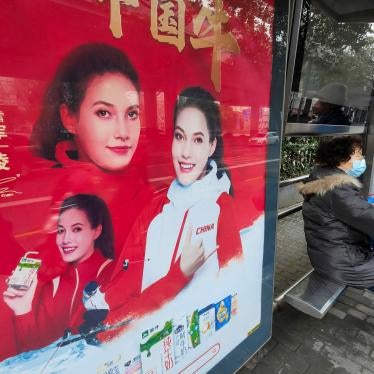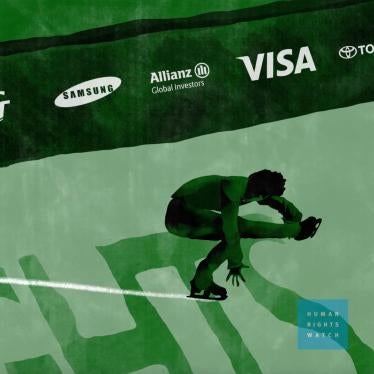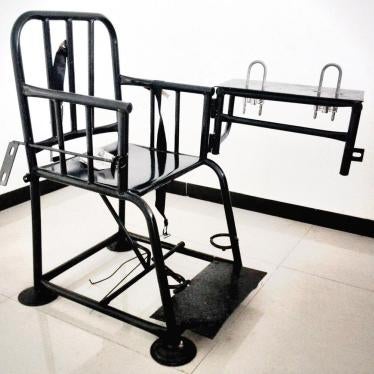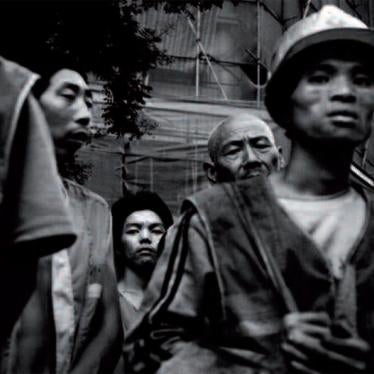January 31, 2022
Thomas Bach
President, International Olympic Committee
Château de Vidy, 1007 Lausanne, Switzerland
Re: IOC Human Rights and Labor Due Diligence in China
Dear Mr. Bach,
We write in response to the International Olympic Committee’s publication of a due diligence document on two suppliers that produce the IOC’s own branded products for the Olympic Winter Games Beijing 2022. We would like to ask questions about the process and express the concerns of Human Rights Watch and the Coalition to End Forced Labor in the Uyghur region (EUFL) about substantive gaps and supply chain transparency related to the current context in China.
In December 2020, Human Rights Watch wrote to urge the IOC to conduct robust human rights due diligence around the preparations for the 2022 Beijing Olympics, and to explain its efforts to manage human rights risks connected to the Games by February 2021. Many partner human rights organizations, including the EUFL coalition, also requested to engage with the IOC and issued cautions about the risk that Olympics-branded merchandise included products that were made with forced labor. Human rights due diligence is a critical part of the framework of the United Nations Guiding Principles on Business and Human Rights (the “Guiding Principles”), and is consistent with the IOC’s commitment to build a strategic framework on human rights.
The 2022 Beijing Games are taking place in a human rights environment significantly worse than the 2008 Beijing Games, as evidenced by the Chinese government’s crackdown on activists, lawyers, and human rights defenders, mass arbitrary detention of one million Uyghurs and Turkic Muslims in Xinjiang (Uyghur region), and the deployment of extremely invasive surveillance technology. The Chinese government has drastically curtailed fundamental freedoms in Hong Kong and attempted to undermine international human rights standards and institutions, most notably at the United Nations.
The IOC announced in 2019 that Hengyuanxiang (HYX) Group and Anta had become its official sportwear uniform suppliers until the end of 2022, including for the 2022 Beijing Games. The IOC’s Supplier Code is dated September 2018 and states that the IOC will monitor its suppliers’ adherence to its requirements through “various methods, including reviewing documented evidence or independent specialist audits if deemed relevant.” The IOC also relies on other suppliers for Olympic-branded merchandise for Beijing 2022, in addition to Hengyuanxiang (HYX) Group and Anta, the only two suppliers that are the focus of this due diligence exercise.
In September 2020, five international labor auditing firms declared that they could no longer audit corporate supply chains in China’s Xinjiang (Uyghur region) because the Chinese government’s controls and repression made it too difficult to determine whether factories are using forced labor. The Better Cotton Initiative, which includes brands such as Adidas, Nike, and Gap, called the Uyghur region an “untenable operating environment.”
Media organizations have reported that both Hengyuanxiang (HYX) Group and Anta continue to use cotton sourced from the Uyghur Region. Researchers and human rights groups have found significant evidence of forced labor in the Uyghyr region cotton farming industry. The IOC’s 2018 Supplier Code requires suppliers to “ensure that they are not complicit in human rights abuses” and states that “any violations of the IOC Supplier Code may jeopardise the supplier’s business relationship with the IOC and may lead to the termination of the contract or cooperation.”
In view of the above, we would appreciate your response to the following questions:
- What human rights due diligence was conducted prior to beginning the relationships with Hengyuanxiang (HYX) Group and Anta, including as regards their activities and sourcing from the Uyghur region? What human rights due diligence regarding Hengyuanxiang (HYX) Group and Anta’s activities was conducted between 2019 and September 2021?
- Other than Hengyuanxiang (HYX) Group and Anta, what are other suppliers of products for the Beijing Organizing Committee of the Olympic Games (BOCOG) that bear the five-rings or Olympics brand? Do any of those other suppliers have operations, suppliers, or business relationships, direct or indirect, including raw material sourcing, with entities in the Uyghur region? What if any due diligence was applied by BOCOG to these other companies given the risk of exposure to Uyghur forced labor?
- Who was the third party that conducted audits of the IOC’s suppliers of its own branded products for Beijing 2022, as described in your Responsible Sourcing Approach document?
- The IOC’s Supplier Code underscores the value of transparency and reserves to the IOC the right to disclose information “about a supplier’s social, environmental and ethical credentials, including full details of all sites used (e.g. factories).” Please therefore disclose:
- A summary of the audit reports conducted for Hengyuanxiang (HYX) Group, Anta and other major suppliers of the IOC’s own branded products for Beijing 2022, including the audit scope, methodology, key findings, corrective action plans, and progress on remediation.
- What if any steps were taken during the audits to ensure workers could speak freely to auditors without risk of reprisals? At what location(s) were worker interviews conducted? Was management at the facilities that were audited aware of which workers the auditors interviewed?
- All names, addresses, and other details of production sites (i.e.garment assembly facilities, fabric mills, spinning mills, and cotton farms and gins) in the supply chain of Hengyuanxiang (HYX) Group, Anta and other main suppliers for the IOC’s own branded products for Beijing 2022. If the IOC is not willing to disclose the information, please explain the reasons.
- What information did Hengyuanxiang Group (HYX Group) and Anta provide to the IOC to substantiate the claimed proof of origin of the materials used in the IOC’s own branded apparel and footwear products?
- What steps has the IOC taken to verify Hengyuanxiang Group (HYX Group) and Anta’s proof of origin claims?
- Did the IOC’s audits of Hengyuanxiang Group (HYX Group), Anta Sports and other suppliers of its own branded products for Beijing 2022 include analysis of the companies’ sourcing practices, including the companies’ systems for tracing and tracking each level of their supply chains, for conducting human rights due diligence over their suppliers, and identifying forced labor in their supply chains? What were the findings of those analyses in relation to both companies’ supply chain tracing and responsible sourcing?
- What steps has the IOC taken to investigate whether Hengyuanxiang (HYX) Group, Anta or other suppliers are complicit, with respect to their Olympic and non-Olympic products, in human rights or labor rights abuses in the Uyghur region or against Uyghur or other Turkic and/or Muslim people, including through participation in coercive labor transfer or surplus labor programs, and what action has the IOC taken as a result?
- As part of its process to assess human rights risks, what steps has the IOC taken to engage in meaningful consultation with potentially affected groups and other relevant stakeholders, including Uyghur groups, and what was the outcome of any consultation?
We reiterate our call for the IOC to swiftly adopt and undertake the commitments outlined by the UN Guiding Principles.
We would welcome a response to these questions and requests, and any other information you would like to provide by February 7, 2022, so that it may be reflected in our reporting.
Thank you for your assistance in these matters. If you wish to contact us, please find our information below.
Sincerely,
Rushan Abbas, Campaign for Uyghurs
Chloe Cranston, Anti-Slavery International
Bennett Freeman, Cotton Campaign
Allison Gill, Global Labor Justice-International Labor Rights Forum
Scott Nova, Worker Rights Consortium
On behalf of the Coalition to End Forced Labour in the Uyghur Region
Sophie Richardson, Human Rights Watch
Minky Worden, Human Rights Watch








